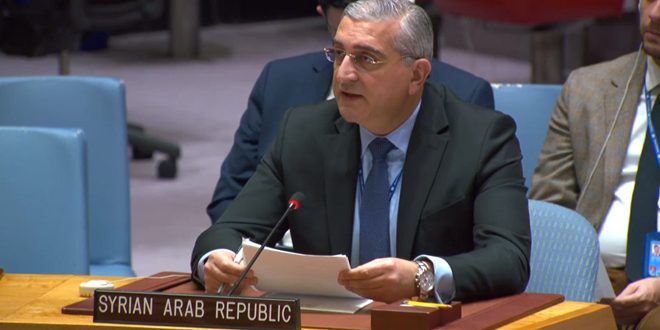Al-Dahhak: Developed countries must assist developing countries to mitigate the effects of climate change
Syria’s Permanent Representative to the United Nations Qussai Al-Dahhak, stressed the need to strengthen international cooperation in the field of climate action, and called on the developed countries to assume their responsibilities in providing the necessary assistance to developing countries, and to fulfill their obligations to mitigate the catastrophic effects of climate change.
He underlined the necessity of immediately, completely and unconditionally lifting the coercive measures that hinder benefiting from technical support, modern technologies and aid allocated to developing countries to enable them to achieve sustainable development goals .
“This month marks the first anniversary of the devastating earthquake that Syria suffered on February the 6th , 2023, which left thousands of victims and injured and destroyed hundreds of buildings, infrastructure and service facilities”, Al- Dahhak said during the Security Council’s high-level open dialogue session on “The Impact of Climate Change and Food Insecurity on Maintaining International Peace and Security.
He indicated that Syria has done its best to deal with the disaster, carry out rescue work and provide care and support to the affected. Syria also granted the necessary facilities to the United Nations and its specialized agencies and permited them to use three border crossings to deliver humanitarian aid to areas under the control of the terrorist groups.
Syria’s permanent representative to the United Nations pointed out that the unilateral coercive measures imposed by the United States and the European Union on the Syrian people have hindered relief and humanitarian work, prevented the provision of heavy machinery, civil protection equipment, and basic medical supplies and materials necessary to rescue the victims, and deprived the affected people and all Syrians of their basic needs including electricity and heating fuel.
Al-Dahhak indicated that Syria, like other countries, is affected by climate change, which has caused a decline in rainfall, increased drought, desertification, and dust storms, which had negative repercussions on the lives of Syrians and their ability to secure their basic needs.
He noted that the terrorist war and attacks left the so-called “International Coalition” and the crimes of its tools have caused severe environmental damage, including those resulting from bombing operations, the seizure of oil pipelines and wells in northeastern Syria and the burning of a number of them, and the extraction and refining of oil in primitive ways, not to mention the burning of vast areas of forests and agricultural land. .
Al-Dahhak added that the Turkish government’s practices exacerbated the suffering of the Syrian people as a result of its violation of international obligations and bilateral agreements and its reduction in the flow rates of the Euphrates River’s water, which caused a significant decline in the river’s water level and harmed about 5 million Syrians who depend on that water in their daily lives.
Syria’s permanent representative to the United Nations referred that the continued Israeli occupation of Arab lands, including the Syrian Golan, has serious repercussions on the environment, as a result of the occupying force’s bulldozing of agricultural lands, cutting down fruit trees, burying hazardous waste, and using internationally banned weapons, including white phosphorus, to burn forests in Lebanon, which constitute a blatant violation of international laws.
Rawaa Ghanam

